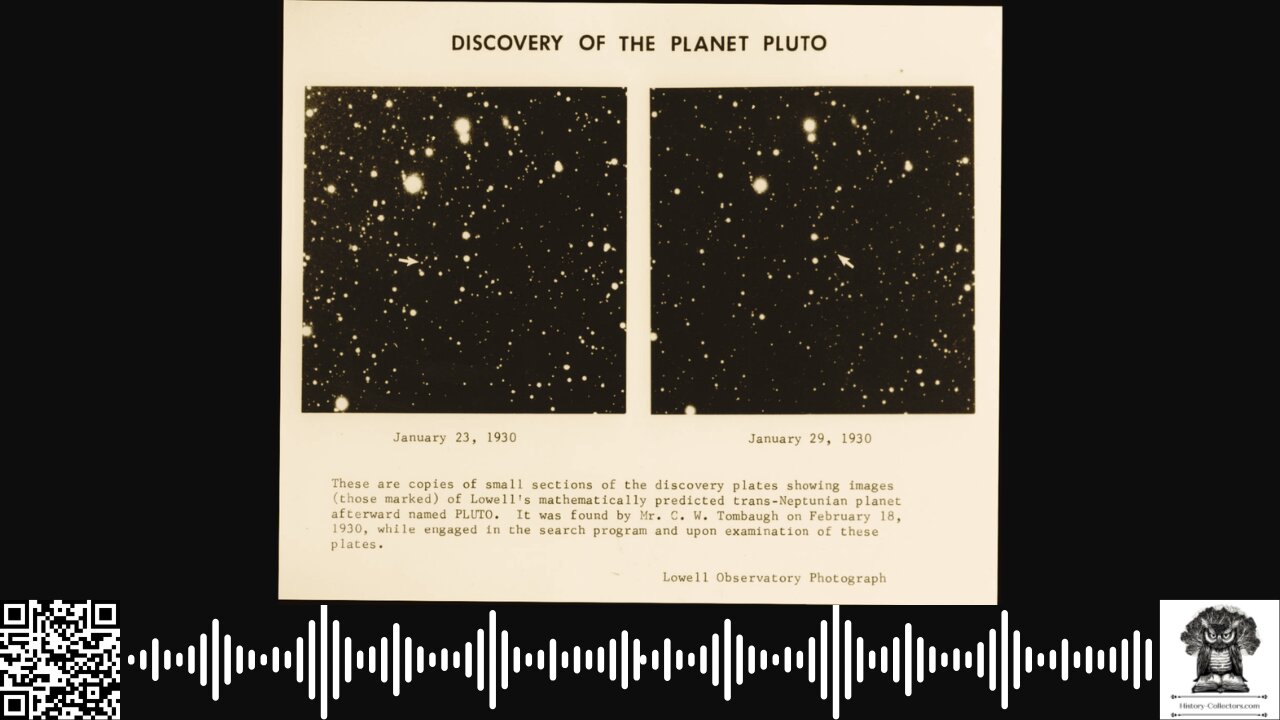Premium Only Content

#OnThisDate February 18, 1930: Cosmic Discovery
https://history-collectors.com/ | Own A Piece Of History
American Astronomer Clyde Tombaugh Discovered Pluto At Lowell Observatory In Flagstaff, Arizona. This Discovery Marked A Major Milestone In Astronomy And Expanded The Known Boundaries Of The Solar System. The Search For Pluto Began Decades Earlier, Driven By The Work Of Astronomer Percival Lowell, Who Hypothesized The Existence Of A Ninth Planet Beyond Neptune Due To Irregularities Observed In The Orbits Of Uranus And Neptune. Lowell Founded The Observatory In 1894, Hoping To Identify This Elusive Planet, Which He Termed “Planet X.” Though He Died In 1916 Without Finding It, His Legacy Set The Stage For Pluto’s Eventual Discovery.
Clyde Tombaugh, Born On February 4, 1906, In Streator, Illinois, Was A Self-Taught Astronomer With A Passion For Observing The Night Sky. In 1929, Tombaugh Was Hired By Lowell Observatory To Conduct A Systematic Search For Planet X. Using A 13-Inch Astrograph Telescope, He Captured Pairs Of Photographic Plates Of The Same Region Of The Sky Several Days Apart. He Then Examined These Plates Using A Blink Comparator, A Device That Allowed Him To Rapidly Alternate Between The Two Images To Detect Any Object That Had Shifted Position.
On February 18, 1930, Tombaugh Identified A Moving Object On Plates Taken On January 23 And January 29, Confirming The Presence Of A Previously Unknown Celestial Body. Further Observations Confirmed That This Object Was Beyond Neptune, Consistent With The Predictions Of A Ninth Planet. Lowell Observatory Publicly Announced The Discovery On March 13, 1930, A Date Chosen To Coincide With The 75th Anniversary Of Percival Lowell’s Birth.
Following The Discovery, The Newly Identified Planet Required A Name. Suggestions Poured In From Around The World, But It Was Venetia Burney, An Eleven-Year-Old Schoolgirl From Oxford, England, Who Proposed The Name “Pluto” After The Roman God Of The Underworld. Her Suggestion Was Forwarded To The Observatory, And On May 1, 1930, Pluto Was Officially Adopted As The Name Of The Ninth Planet. The Name Was Particularly Fitting, As It Honored Both Percival Lowell, Whose Initials “PL” Were Contained In The First Two Letters, And The Cold, Distant Nature Of The Celestial Body.
Pluto’s Discovery Marked A Turning Point In Astronomy, Prompting Scientists To Reevaluate The Outer Solar System. For Decades, It Was Regarded As The Ninth Planet Until Further Astronomical Advances Challenged Its Classification. In The Late 20th Century, The Discovery Of Similar-Sized Objects In The Kuiper Belt, A Region Of Icy Bodies Beyond Neptune, Raised Questions About Pluto’s Status.
In 2006, The International Astronomical Union (IAU) Officially Redefined The Criteria For Planethood, Leading To Pluto’s Reclassification As A Dwarf Planet. This Decision Sparked Controversy, But It Also Highlighted The Ongoing Evolution Of Astronomical Understanding. Pluto Remains A Significant Celestial Body, And The 2015 Flyby Of NASA’s New Horizons Spacecraft Provided Unprecedented Images And Data About Its Surface, Atmosphere, And Moons.
Clyde Tombaugh’s Discovery Of Pluto Demonstrated The Power Of Dedication, Precision, And Scientific Inquiry. His Work At Lowell Observatory Expanded Human Knowledge Of The Outer Solar System And Inspired Generations Of Astronomers. Despite Its Reclassification, Pluto’s Discovery Remains A Landmark Event In The History Of Space Exploration, Reflecting Humanity’s Enduring Quest To Understand The Cosmos.
--------------------------------------------------------------------------------------------
Whether You're Commuting, Working Out, Or Just Relaxing, These Recordings Give You The Freedom To Absorb Knowledge At Your Own Pace, Wherever You Are.
Tune In To Focus Deeply On The Content Without Visual Distractions, And Easily Control Playback To Review Complex Topics As Needed.
Perfect For Auditory Learners Or Anyone Looking To Maximize Their Time — Click Play All To Listen Now And Transform Your Time Into A Productive Learning Session!
For Enthusiasts Of Historical Ephemera, Visit History-Collectors.com To Find Collectibles That Might Complement Your Collection.
You Can Own A Piece Of History.
Before You Go, A Simple Way To Support The Efforts Of This Channel Is To Like, Subscribe, Comment And Share.
-
 4:16
4:16
History-Collectors.com
1 day ago#OnThisDate February 19, 1942: Internment's Injustice
10 -
 1:02:57
1:02:57
In The Litter Box w/ Jewels & Catturd
22 hours agoKASH CONFIRMATION TODAY! | In the Litter Box w/ Jewels & Catturd – Ep. 746 – 2/20/2025
46.1K41 -
 DVR
DVR
VSiNLive
1 hour agoFollow the Money with Mitch Moss & Pauly Howard | Hour 1
7.49K1 -
 LIVE
LIVE
John Crump Live
5 hours agoUSA v. Canada! Bigger Than Just A Game
129 watching -
 LIVE
LIVE
Revenge of the Cis
2 hours agoEpisode 1450: Wet Work
1,585 watching -

vivafrei
8 hours agoKash Patel Confirmation Hearing LIVE! Jan. 6'er Kicked Out of CPAC? DOGE Wins in Court? & MORE!
223K214 -
 5:08:38
5:08:38
Barry Cunningham
7 hours agoTRUMP DAILY BRIEFING: KASH PATEL VOTE | WHITE HOUSE PRESS CONFERENCE | DOGE UPDATE
34K20 -
 1:57:54
1:57:54
The Quartering
6 hours agoRand Paul Praises Trump, Amazon Takes Control of Bond, and Delta Gives Passengers $30,000
70.7K29 -
 1:01:59
1:01:59
The White House
4 hours agoPress Secretary Karoline Leavitt Briefs Members of the Media, Feb. 20, 2025
81.2K62 -
 59:58
59:58
Russell Brand
6 hours agoLive from Mar-a-Lago: The Globalist Empire’s Last Stand – SF541
141K141